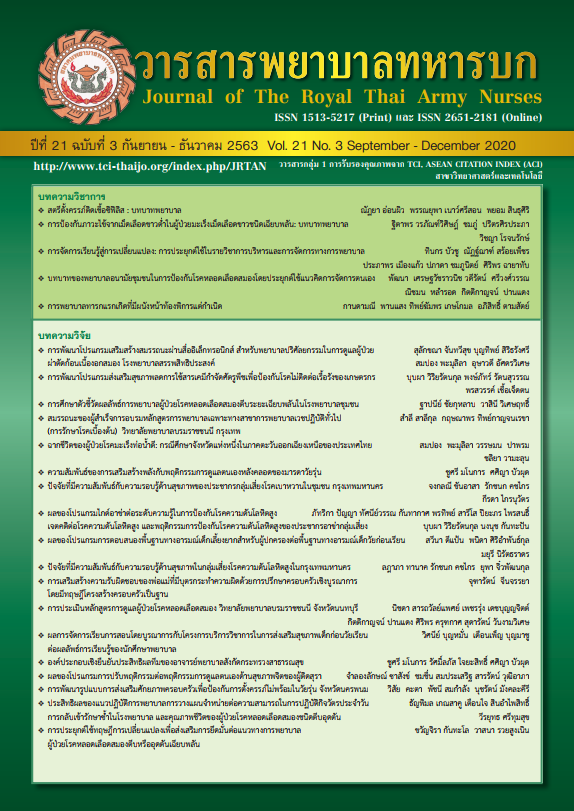Effects of An Integrating Academic Service Project in Health promotion for Preschool Age on Learning Outcomes of Nursing Students
Keywords:
Integrating academic service in learning, Health promotion for preschool age, Learning outcomes of nursing studentsAbstract
The purpose of this study were to examine effects of an integrating academic service project in health promotion for preschool age on learning outcomes of nursing students. The sample consisted of 64 nursing students in faculty of nursing who registered in child and adolescent nursing I subject in academic 2015, Ubonratchathani University, selected by a purposive sampling. Data were collected by developed questionnaire which consisted of 3 components; 1) Personal data questionnaire 2) Learning outcomes of nursing students questionnaire; Ethics and moral, Cognitive skills, Interpersonal skills and responsibility, Numerical analysis, communication and information technology skills 3) Learning outcomes in knowledge of health promotion for preschool age questionnaire. Data were analyzed by descriptive and paired t-test.
The results found that students perceived that their learning outcomes were as follow: The mean score of learning outcomes in numerical analysis, communication and information technology skills at a very good level (Mean = 4.43, SD = 0.48), ethics and moral at a very good level (Mean = 4.31, SD = 0.42), interpersonal skills and responsibility at a very good level (Mean = 4.27, SD = 0.46), and cognitive skills at a good level (Mean = 4.16, SD = 0.47). The mean score of knowledge in learning outcomes of health promotion in preschool age after intervention was significantly higher than before intervention (p < .001).
The result from this study recommended that nursing curriculum should develop an integrating service project in learning in order to promote learning outcomes of nursing students.
Downloads
References
The higher education commission. Thai Qualifications Framework for Higher Education (TQF: HEd). The higher education commission Ministry of Education; 2010. (in Thai).
Faculty of nursing Ubonratchathanee University. Nursing curriculum 2011. Faculty of nursing Ubonratchathanee University; 2011. (in Thai).
Wongsawat S, Siriwanij W. Learning Management Outcome from an Integrated instruction between Authentic Learning and Community Academic Service for nursing students in the Human Society; 2013. Boromarajonani collage of nursing Nakornratchasima. (in Thai).
Chaleoykitti S, Chewsothon S, & Butpunya Y. Effectiveness of the Integrated Academic Service and Teaching-Learning Arrangement in Psychiatric Nursing Practicum Course to Psychiatric Nursing practice competency in Army Nursing. Journal of The Royal Thai Army Nurses. 2017; 18(3): 144-151. (in Thai).
Chaleoykitti S, Bandansin J, Kanglee K, Kumpraw P. The study of academic services integration with teaching and learning of general education for human development course on volunteer and happiness of study among 1st year nursing students of The Royal Thai Army Nursing College. Journal of The Royal Thai Army Nurses, 2014; 15(3): 412-429. (in Thai).
Chompunud, S., Inkaew W., Academic service integration with teaching and learning of the practicum of selected nursing area: community healthnursing course. Journal of the police nurses, 2017; 9(1): 24-36. (in Thai).
Turner K, Boonprasithi T, Pinyomit S. Effects of an integrating academic service project into English course for nursing students. Journal of Nursing and education, 2010; 3(2): 28-43. (in Thai).
Dachakupt P, Yindeesuk P. Learning management in the 21st Century. 2nd ed. Bangkok: Chulalongkorn university press; 2015. (in Thai).
Faculty of nursing Ubonratchathanee University. The survey of Quality of nursing students Ubonratchathanee University in Academic year 2016. Ubonratchathanee University; 2016. (in Thai).
Downloads
Published
How to Cite
Issue
Section
License
บทความหรือข้อคิดเห็นใดใดที่ปรากฏในวารสารพยาบาลทหารบกเป็นวรรณกรรมของผู้เขียน ซึ่งบรรณาธิการหรือสมาคมพยาบาลทหารบก ไม่จำเป็นต้องเห็นด้วย
บทความที่ได้รับการตีพิมพ์เป็นลิขสิทธิ์ของวารสารพยาบาลทหารบก
The ideas and opinions expressed in the Journal of The Royal Thai Army Nurses are those of the authors and not necessarily those
of the editor or Royal Thai Army Nurses Association.






